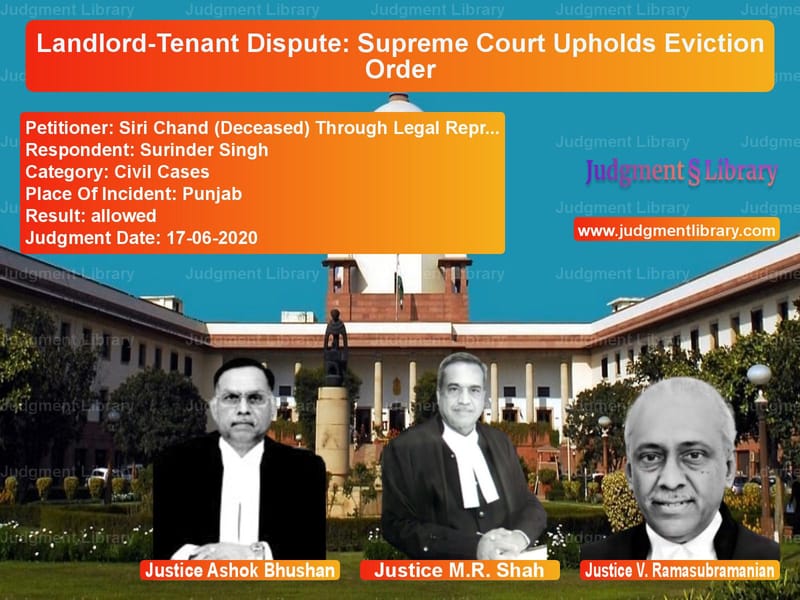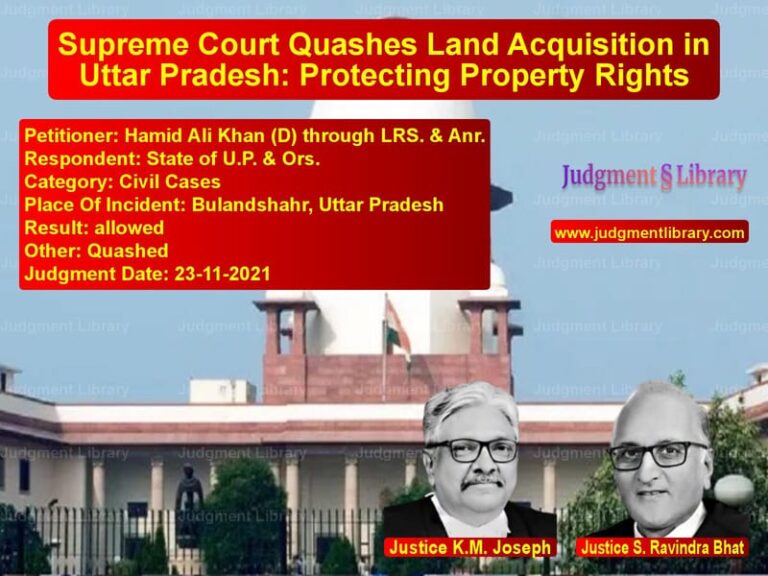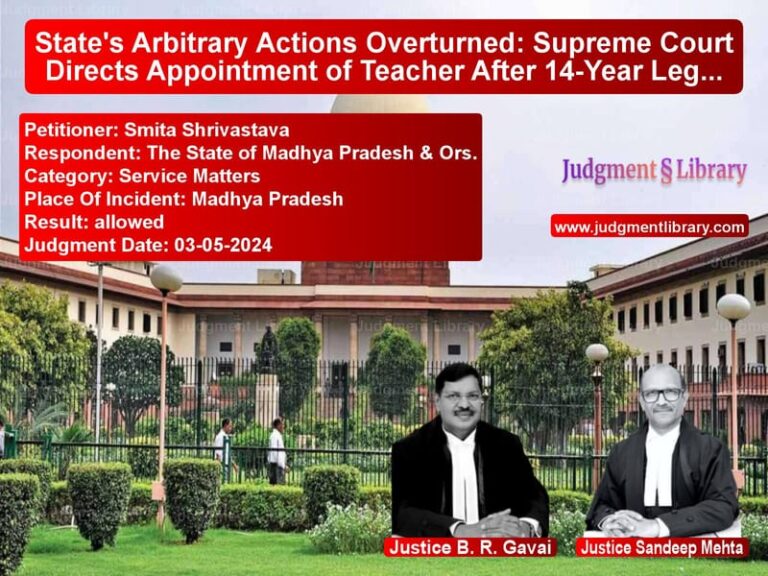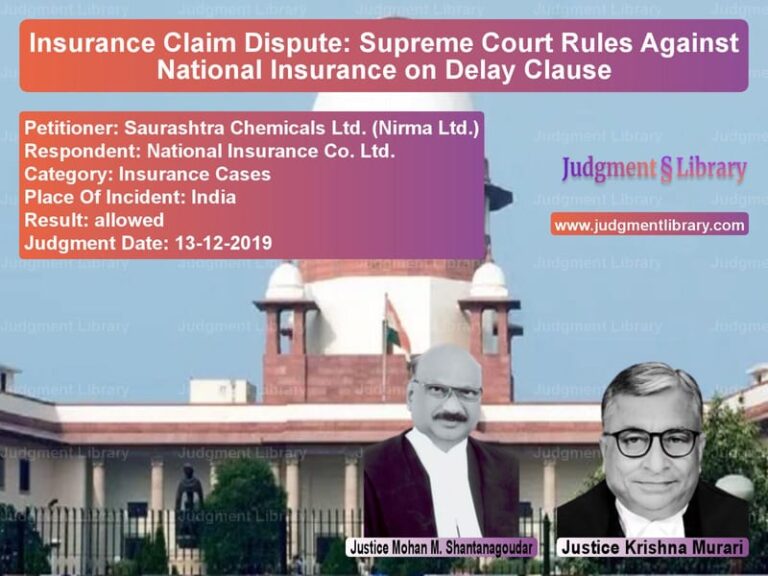Landlord-Tenant Dispute: Supreme Court Upholds Eviction Order
The Supreme Court of India recently delivered a judgment in the case of Siri Chand (Deceased) Through Legal Representatives vs. Surinder Singh, which revolved around a long-standing landlord-tenant dispute. The case primarily focused on unpaid rent, the enforceability of a rent deed, and the validity of an eviction order passed by the Rent Controller. This judgment has significant implications for rental agreements and tenant rights in India.
The case arose from a dispute over a shop rented by the respondent, Surinder Singh, from the appellant-landlord, Siri Chand. The Supreme Court was called upon to decide whether the rent note required compulsory registration under the Registration Act, 1908, and whether the tenant was in default of rent and house tax payments, justifying his eviction.
Background of the Case
The dispute originated when the landlord, Siri Chand, filed an eviction application against Surinder Singh under Section 13 of the East Punjab Urban Rent Restriction Act, 1949, alleging that the tenant had defaulted on rent and house tax payments. The main contentions of both parties were as follows:
Landlord’s Arguments:
- The tenant had agreed to pay Rs. 2,000 per month as rent, along with house tax and electricity charges.
- The tenant defaulted on rent payments for several months and failed to pay house tax from 1999 to 2005.
- The eviction was sought based on unpaid dues and a violation of the terms of the rent agreement.
Tenant’s Arguments:
- The actual rent was Rs. 1,000 per month, and not Rs. 2,000 as claimed by the landlord.
- The rent deed presented by the landlord was a fabricated document and was not properly executed.
- The landlord had taken the tenant’s signature on blank papers and later used them to create the rent note.
Decisions of the Lower Courts
The Rent Controller, after examining the evidence, ruled in favor of the landlord and ordered the eviction of the tenant. The key findings of the Rent Controller were:
- The rent note (Exhibit A-1) was a valid document, proving that the agreed rent was Rs. 2,000 per month.
- The tenant was in arrears of rent and house tax payments, making him liable for eviction.
- The landlord-tenant relationship was clearly established, and the tenant’s claim that the rent note was fabricated was not accepted.
The tenant challenged this order before the Appellate Court, which reversed the decision, ruling that:
- The rent note was compulsorily registrable under Section 17(1)(d) of the Registration Act, 1908.
- Since the document was not registered, the condition regarding a 10% annual rent increase was not enforceable.
- The eviction order was set aside on these grounds.
The landlord then approached the Punjab and Haryana High Court, which upheld the Appellate Court’s ruling, leading to the present appeal before the Supreme Court.
Supreme Court’s Analysis and Judgment
The Supreme Court examined two critical legal issues:
1. Whether the rent note required compulsory registration?
The Court analyzed the relevant clauses of the rent note, which stated that:
- The rent was payable monthly.
- The landlord could evict the tenant if rent was not paid by the 5th of each month.
- The landlord could serve a one-month notice to vacate the premises if required.
The Court noted that since no fixed term was mentioned in the rent agreement, it could not be considered a lease exceeding one year or a lease from year to year, which would require registration under Section 17(1)(d) of the Registration Act, 1908. The Supreme Court held that:
“When the lease deed does not mention the period of tenancy, other conditions and the intention of the parties must be considered. Since the rent deed in this case was clearly for monthly tenancy, it did not require compulsory registration.”
2. Whether the tenant was in default and liable for eviction?
The Supreme Court found that the Appellate Court had not examined whether the tenant had paid the due rent and house tax. The findings of the Rent Controller, which had established the tenant’s default, were not overturned based on evidence. The Court ruled:
“No finding was returned by the Appellate Court that the tenant was not in default or that he had deposited the necessary amount to save himself from eviction. Therefore, the eviction order should not have been interfered with.”
Accordingly, the Supreme Court allowed the appeal, restored the eviction order passed by the Rent Controller, and ruled in favor of the landlord.
Key Takeaways from the Judgment
- A rent agreement must be examined in totality to determine whether it requires registration.
- For a tenancy to be considered from year to year, the lease agreement must explicitly state a fixed period or an annual rent reservation.
- In eviction cases, a defaulting tenant cannot escape eviction merely based on procedural technicalities related to document registration.
- The findings of fact by the Rent Controller should not be disturbed unless there is a clear legal basis to do so.
Conclusion
This case underscores the importance of properly drafted rent agreements and adherence to legal procedures in landlord-tenant disputes. The Supreme Court’s decision clarifies that monthly tenancies do not require compulsory registration and that tenants who default on rent payments can be evicted if their liabilities are proven. This ruling provides a crucial precedent for similar disputes in the future.
Petitioner Name: Siri Chand (Deceased) Through Legal Representatives.Respondent Name: Surinder Singh.Judgment By: Justice Ashok Bhushan, Justice M.R. Shah, Justice V. Ramasubramanian.Place Of Incident: Punjab.Judgment Date: 17-06-2020.
Don’t miss out on the full details! Download the complete judgment in PDF format below and gain valuable insights instantly!
Download Judgment: Siri Chand (Deceased vs Surinder Singh Supreme Court of India Judgment Dated 17-06-2020.pdf
Direct Downlaod Judgment: Direct downlaod this Judgment
See all petitions in Landlord-Tenant Disputes
See all petitions in Contract Disputes
See all petitions in Property Disputes
See all petitions in Specific Performance
See all petitions in Debt Recovery
See all petitions in Judgment by Ashok Bhushan
See all petitions in Judgment by Mukeshkumar Rasikbhai Shah
See all petitions in Judgment by V. Ramasubramanian
See all petitions in allowed
See all petitions in supreme court of India judgments June 2020
See all petitions in 2020 judgments
See all posts in Civil Cases Category
See all allowed petitions in Civil Cases Category
See all Dismissed petitions in Civil Cases Category
See all partially allowed petitions in Civil Cases Category







